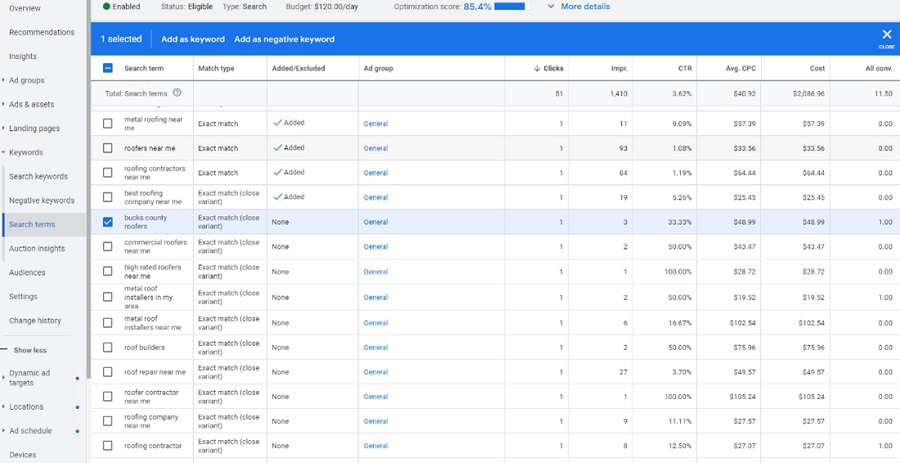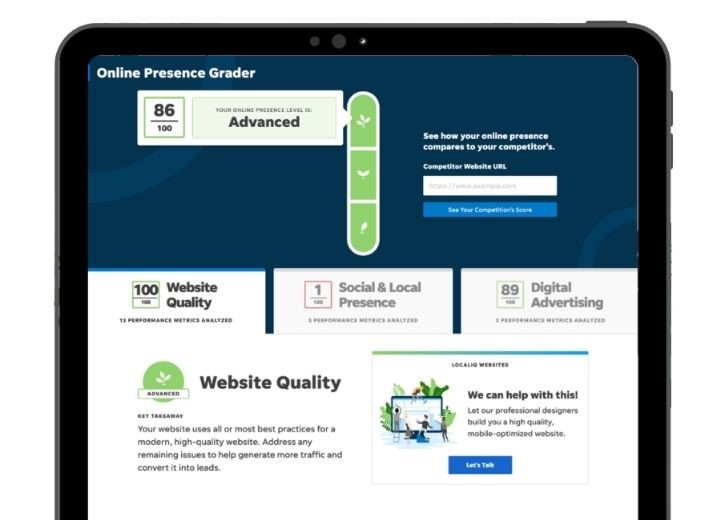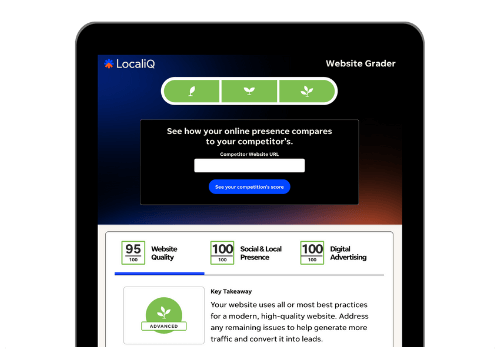There are some facts that we simply can’t deny. And just like how we can’t live without water, your pay-per-click (PPC) campaign can’t function without keywords.

How your account looks as it’s thirsting for quality PPC keywords.
Your PPC keyword research acts as the water your account needs to successfully survive and grow. But executing quality keyword research for PPC can be a daunting task for busy business owners. Luckily, we’re here to streamline the process for you with this complete guide to keyword research for PPC—which will include answers to FAQs like:
- What is PPC keyword research?
- Why is keyword research for PPC important?
- How do you do keyword research for PPC ads?
Take your keyword research for PPC to the next level with this ultimate cheat sheet.
Your PPC keyword research table of contents
- What is keyword research for PPC?
- Why is keyword research for PPC important?
- PPC keyword research tools
- How to do keyword research for PPC
- How to use your PPC keyword research
- How to measure your PPC keyword research success
What is keyword research for PPC?
To understand why you need PPC keyword research for your business and how to do PPC keyword research successfully, let’s first establish a solid foundational knowledge of the basics.
Keywords are at the heart of your local PPC advertising strategy. They indicate to platforms, like Google or Microsoft, what types of search queries or content you want your ads to show for. In other words, the search platform will take your keyword and match it up to a query that someone would type into the search bar.
Keyword research for PPC is the practice of identifying the keywords to bid on that will show your ads to the right searchers and drive clicks and conversions for your advertising campaigns.
Understanding PPC keyword intent
You can’t be successful in your keyword research for PPC without first understanding search intent. Search intent is the purpose behind an online search.
Identifying your ideal keyword intent ensures that your keywords relate back to your audience’s main wants or needs throughout their buyer’s journey.
For example, if your PPC goal is to increase sales, you don’t want to use keywords that could match someone’s search simply looking for information.
This chart shows the most common types of keyword intent:

When it comes to your PPC keywords, transactional and commercial intent keywords are usually your best bet. If you’re unsure of a keyword’s intent, you can search for it to see what types of results come up.
The anatomy of a great PPC keyword research list
Your list of PPC keywords should hold these core qualities:
A mix of long-tailed and short keywords
A long-tail PPC keyword is one that has more than about three words. Long-tail keywords are more specific and can help you better match your ideal searcher’s intent. However, there may be a few short-tail keywords (single-word keywords) that are important for your business to include as part of your PPC keyword list. So, it’s best to test varying lengths of keywords to identify your best mix of single-word keywords and long-tailed keywords within your list.
Strong search intent
You don’t want to waste your marketing budget on clicks from people who aren’t ready to convert. Be sure your list of PPC keywords targets searchers that clearly intend on completing an action with your business.
Mostly high search volume but low competition and average CPC keywords
When you use online tools to assist you in conducting keyword research for PPC, you’ll most likely get insights into three main keyword characteristics:
- Volume: A keyword’s estimated search volume shows how many searches are conducted for that keyword within a specific area or timeframe (on average). The higher the volume, the more popular the keyword is–meaning you’ll likely have more chances for your ad to show.
- Competition: This is a rating of how competitive your keyword is estimated to be depending on how many other businesses are bidding on it. Higher competition means there will likely be a lot of other ads on the page, and you may have to finesse your ad copy to help your business stand out.
- Average CPC: Your chosen keyword research tool may also estimate the average cost per click (CPC) for your keyword. Obviously, a low average CPC is wonderful—but don’t let a higher estimation stop you from choosing the best keywords for your business. Most accounts will have a variety of both high and low-cost keywords.

Depending on your tool, average CPC may instead be displayed as the low and high-end average bids for the keyword, like in this example from WordStream’s Free Keyword Tool.
Set match types
It’s required to assign each of your PPC keywords on your list a match type. This tells Google or Microsoft how specific you want your keyword to be by only matching to specific types of searches. Match types have changed over the years, but here are the current match types you have available to choose from:
- Broad match: The least restrictive match type, broad match shows your ad to any searches contextually aligned to your keywords.
- Phrase match: An intermediate when it comes to restriction, phrase match connects your ads to any searches similar to your keywords.
- Exact match: The most restrictive match type, exact match only allows your ad to show for queries synonymous with your keyword.
We’ll cover how to choose your match types later in our “how-to” steps, but for now, try to keep in mind that any keywords you may be considering will also need a match type assigned to them—which can impact the behavior of that keyword.

Why is keyword research for PPC important?
You need your keywords to be in tip-top shape to maximize your ad strategy’s marketing ROI. In fact, PPC returns an average of $2 for every $1 spent, which comes out to a 200% ROI. Plus, PPC generates double the amount of website visitors when compared to local SEO (but it’s important to have both as part of your marketing strategy!).
But, in order for your business to become a part of those amazing stats, you need a tightly aligned PPC keyword research plan.

PPC keyword research tools
As you can tell, there’s a lot of thought that will go into choosing your business’s PPC keywords. Your PPC keywords can make or break your business growth, so you’ll want to leverage some marketing tools to ensure your research is done right.
Free PPC keyword research tools
There are plenty of free keyword research tools that can help you build out your strategy, like these below:
- Google Keyword Planner: Google has a free keyword research tool right from within the platform called the Google Keyword Planner. It’s convenient because you can add keywords directly to your campaigns from that tool. Plus, you can research keywords (and organize that research) in several customizable ways.
- WordStream Free Keyword Tool: If you want an all-in-one free PPC keyword research tool that gives you customizable and downloadable results, look no further than WordStream’s free keyword tool! All you have to do is enter your website URL, select your industry, and your location, to get an in-depth list of relevant keywords complete with volume, cost, and competition data.
- Google Trends: Google Trends tells you the popularity of terms over time within certain geographical locations. While Google Trends isn’t meant to pump out PPC keyword research ideas, this free tool can help you estimate what keywords might be most popular within your targeted area.
- Google Search: Believe it or not, good ole’ Google Search can help you brainstorm PPC keywords because it shows you the results for queries you’re interested in. Plus, you can get an idea of other popular related keywords by seeing what Google might suggest as you type something in or by checking out the People Also Ask sections.

An example of how Google Search suggestions could help you to do keyword research for PPC.
Looking for other keyword research tools? Our friends at WordStream put together 14 more free keyword research tools to check out.
Paid PPC keyword research tools
If you’re looking for more advanced results and willing to put a bit of budget behind your keyword research for PPC, here are some paid keyword research tools:
Alternatively, you could outsource your keyword research for PPC.
Regardless of what suite of solutions you choose to assist you in your PPC keyword research journey, the steps will be the same. Let’s walk through those next!
How to do keyword research for PPC
Here’s how to do keyword research for PPC in 10 easy steps:

1. Outline your PPC goals
Like with any marketing strategy, you’ll want a goal-oriented approach to your keyword research for PPC. That’s because your business’s advertising goals can help you understand the right keyword intent to shoot for.
For example, let’s say you own a home services business that’s currently promoting an educational newsletter. If your goal is to get people to sign up for your newsletter so that you can build your email list, you might want to lean in on keywords that translate to people looking for information. So, you might choose “what are the best kitchen countertop options” versus “how to install kitchen countertops.” That way, you know the traffic you match to will be interested in completing your desired action and increase your chances of hitting your goals.
Defining SMART goals for your PPC is a common exercise when starting out your keyword research:

2. Brainstorm a list of core products/services
In order to start gathering ideas for what to even look for on Google or in a keyword tool, you have to start somewhere: with what you’re offering in your ads. Think about your main products or services that might be the most popular among customers.
It’s okay if you only have a short list of one or two offerings if you’re in a niche market (like real estate), but you might find you have a longer list if you’re in industries like home services, healthcare, and more.
Here’s an example of how a roofing business might break out their keyword research for PPC:
- Roofing installations
- Gutters and siding
- Roof repairs

An example of how you might break out your PPC keywords in your account.
3. Think of PPC keywords based on category
Once you have the main buckets of the products or services you’re looking to advertise, you’ll want to find PPC keywords that serve different purposes within those topics. There are four categories you’ll find your keywords falling into:
- Brand terms: Any keywords that contain your business’s name or trademarked terms. Ex. “Miller-Todd Orthodontics”
- Generic terms: These are the typical keywords related to your products or services. Ex. “dental cleaning”
- Related terms: Some keywords might not outline exactly what product or service you’re advertising but could be what your typical customer might be looking for. Ex. “toothache pain relief”
- Competitor terms: The brand names of your competitors. Ex. “Gentle Dental of New England”
Of course, you’ll have varying results depending on the types of keywords you choose.
For example, bidding on a competitor keyword might run you a higher CPC and lower conversion results, as people searching for your competitor’s brand name aren’t necessarily looking for your business. Although, that scenario might be worth it to you if you’re looking to build brand awareness in a competitive space.

4. Refine your list using PPC keyword research tools
Now that you’ve got your initial brainstorming out of the way, it’s time to start plugging your ideas into a keyword research tool. That way, you can identify long-tail keywords based on your core terms that you might have not necessarily thought of otherwise.
5. Cross-check your list using Google Search
Once you have a solid list of keywords, you want to get an idea of the types of results you might be up against for certain keywords to be sure they’re a good fit. Try popping open an incognito window and searching some of your selected keywords as if you were a newly interested consumer.
Take note of what other ads on the page are offering to see if the keyword is truly relevant to what your business will be advertising. This can help you get into the customer’s mindset. That way, you can optimize your ad copy or landing page according to what similar ads might be doing. When you have an idea of what searchers might be used to expecting, you’ll be able to provide them with a better advertising experience with your business.

This landing page is optimized to promote “pool cleaning” rather than other maintenance services the business offers to capitalize on what’s probably their most sought-after keyword.
6. Look to your competition
To get even more refined PPC keyword ideas, look no further than your competitors. While it’s impossible to see what your competitors are really bidding on (unless you had access to their Google Ads account!), you can still get an idea of what PPC keywords they might be using.
Check out their ad copy to see if you can identify any keywords they might be targeting within their text, or look through their website for any terms that stick out to you. You can assume that words that pop up a lot in their marketing assets are most likely keywords they’re also bidding on—and you may decide you want to bid on those terms too!
7. Finalize and organize your keyword list
At this point in your PPC keyword research, you probably have a long list of possible keywords, so it’s time to cut down to your final few. A common question that arises here is how many keywords should you have? While there is no set right answer for all accounts out there, the recommended number is less than you might think.
Thanks to the rule of close variants, Google and Microsoft read through the context of searches—which allows you to get more with fewer keywords. If you think you’re outsmarting your searchers by including misspellings or slight variations of the same keyword, think again. That just piles on more keywords for a management mess.
Your ideal number of keywords can change over time and will depend on your account structure. We tend to see accounts starting with 10-20 keywords per ad group, but some businesses find success with less than five or 10 keywords per ad group. Alternatively, you could find that some businesses in your industry might be leveraging a marketing partner to manage hundreds of keywords.
The point of this step, though, is to pick your star keywords from the long list you just brainstormed to make your PPC strategy both precise and easy to manage within your available bandwidth.

An example of how one keyword covers many terms thanks to the close variant indicators shown on the right.
8. Assign match types
Before you apply your PPC keywords to your account, you’ll want to have an idea of the match types you’ll assign to them. Remember, you’ll have to choose between broad match, phrase match, or exact match.
Broad match is the least restrictive, so you’ll see more impressions. That means broad match may also run the risk of slightly less relevant searches and, in turn, possibly a lower click-through rate.
Meanwhile, exact match is the most restrictive, so you might not have many chances to show depending on the search volume of your keywords. However, when your ads do show up, you could have a higher likelihood of driving a click and/or conversion since the search query would be so specific.
We recommend phrase match as a starting point since it gives you enough flexibility to drive more impressions and traffic while weeding out any possibly irrelevant searches. However, there are varying points of view on which match type is best to start with. For example, Google recommends broad match because it maximizes your chances to show up in search results.
Another factor you may want to consider is cost and competition. An exact match keyword might best target the searchers you want to capture, but they typically incur higher costs and are more competitive. Similarly, some broad match searches might be slightly less valuable to your business, so we tend to see a lower CPC from them.
Try estimating what an average CPC for your business might look like using our search ad benchmarks to know if a certain match type is worth trying.
There is no “secret recipe” when it comes to choosing the right match type. You can change your match type any time you want. It’s best to try a couple of different match types to see what works and have a variety of match types throughout your account to maximize results.

9. Don’t forget about negative keywords
Negative keywords? Yup, you read that right. You just spent all this time thinking about what you do want to show for, but you also must consider what you don’t want to show for when doing keyword research for PPC.
Negative keywords help you remove certain terms so that you never show for them when they pop up in the search bar. Negatives can be just as important as your PPC keywords since they can act as a safety net by protecting you from unwanted search queries and clicks.
Now, if you started adding a negative keyword for everything unrelated to your business, you’d go down an endless rabbit hole. After all, your chosen keywords are supposed to help you only show for relevant searches anyways. So, use negative keywords for anything that might still squeeze through your keyword targeting.
For example, common negatives for B2C businesses are those relating to jobs because people might be searching for your PPC keywords in order to make a move into your field. You might ideally want a potential patient to type in your keyword of “oral surgeon” in order to schedule an appointment. Depending on your match type, that could also trigger searches like “oral surgeon salary” or “oral surgeon career path.” The tricky part, though, is you still want to show for “oral surgeon.” In this case, your negative keywords would just need to be “salary” and “career path.”
Negative keywords are usually added over time. So don’t worry about thinking ahead to all your potential irrelevant traffic right away. Google’s Search Terms Report displays the top searches you show for and can be a valuable tool for adding negative keywords as they come your way.

10. Use data and insight tools for continuous PPC keyword research
Your keyword research for PPC should never fully come to a stop. Once you feel your initial keyword research is complete and you’ve applied your selection to your account, it’s time to start searching once again for new keyword ideas or ways to optimize your current keywords.
When it comes to PPC, there is always room for improvement. Google’s Search Terms Report is as helpful for adding keywords as it is for negatives since you can identify top search queries you’ve shown for that could be eligible keywords to try down the line.
Related: Did you know there are other new features in the Google Ads platform that can help you optimize your PPC keywords? Check out our latest roundup of Google Ads updates.

An example of how the Google Search Terms Report can come in handy for adding both keywords and negatives.
How to use your PPC keyword research
Congratulations! You’ve completed your keyword research for PPC, but now what? Here are six ways to use your PPC keyword research:
Implement search ads
The main use-case for PPC keywords? Search ads, of course! Use your newly chosen keywords in your search campaigns to start advertising for relevant searches.

An example of a search ad in search results. This business is probably targeting the keyword “wedding planning.”
Target display ad placements
Display campaigns show image-based ads passively to folks as they surf various web pages. When you implement display ads, you don’t want to just have your ad slapped onto any and every eligible page out there. That’s where display keywords come in.
They act as a form of content targeting that indicate not who you want to show to, but where you want your ad to show. Your display keywords can indicate to Google that your display ads should only show on pages that contain or relate to your keywords.

Optimize Smart and automated campaigns
Certain Google Ads and Microsoft Ads automated campaign types, like Performance Max or Smart campaigns, require you to plug in “keyword themes.” While these automated campaigns do all the heavy lifting for you, you can add keyword themes to help guide the campaign’s machine learning. Use your PPC keyword research to help you identify what might be the best terms to use as your themes in these cases.

Improve ad copy
If you’re feeling stumped when figuring out what to say when writing your ad copy, your keywords are there to help. It’s a copywriting best practice to include some of your top keywords in your ad copy to ensure you’re showing a relevant ad to your searcher.

An example of a search ad that’s filled with relevant keywords.
Grow your Quality Score
Once a PPC keyword has accrued enough data, it will get a Quality Score assigned to it. Quality Scores help Google and Microsoft determine your ad’s worth in the ad auction. The score is out of 10, with anything above a seven generally being the hard-to-achieve top of the pack. Quality Score is comprised of three main components:
- Ad relevancy: How relevant your keyword is to your ad content, so including your keywords in your ad copy can help boost this.
- Landing page experience: Your landing page should include your keywords to show it’s relevant to your audience and provide a smooth, high-quality user experience.
- Expected click-through rate: The likelihood in which Google or Microsoft anticipates your keyword will be able to generate a click. Choosing high-intent and high-volume keywords can help with this.
Leveraging your PPC keyword research to choose keywords that are likely to get a good quality score can help you win more ad auctions in the future.

Improve your website and landing page content
You can use data from your best-performing PPC keywords to optimize your website and landing page content around. For example, if you find that a certain keyword from your list shines as a top performer, you may want to include that term more frequently when working on your website copywriting.

Our free website grader can help you identify gaps between your website and PPC keyword strategy.
How to measure your PPC keyword success
Be sure your chosen PPC keywords are effective in increasing traffic to your website and getting conversions using the data you have on hand in Google Ads, Microsoft Ads, and Google Analytics. Regularly check in and track your progress with PPC metrics like:
- Clicks
- Click-through rate
- Conversions
- Conversion rate
- Cost-per-click
- Cost per conversion (also known as cost per lead)
These important keyword KPIs can indicate when a keyword might need to be adjusted or paused. Your PPC keyword strategy should flex to your account’s needs, so don’t be afraid to add, remove, pause, or reenable keywords as necessary.
Related: Want more insights into your PPC keyword performance? Try WordStream’s free Google Ads Grader tool to get a true read on key metrics like Quality Score, impression share, and more!

An example of the keyword performance view in Google Ads.
Do keyword research for PPC now to see amazing results later
Keyword research for PPC might take some time and resources, but the results will be well worth it. We always say the hardest part of PPC is patience! So, embrace and enjoy the time you carve out for your PPC keyword research. And, if you are still unsure of which keywords are the best fit for your business’s PPC account, our experts are always here to help.







